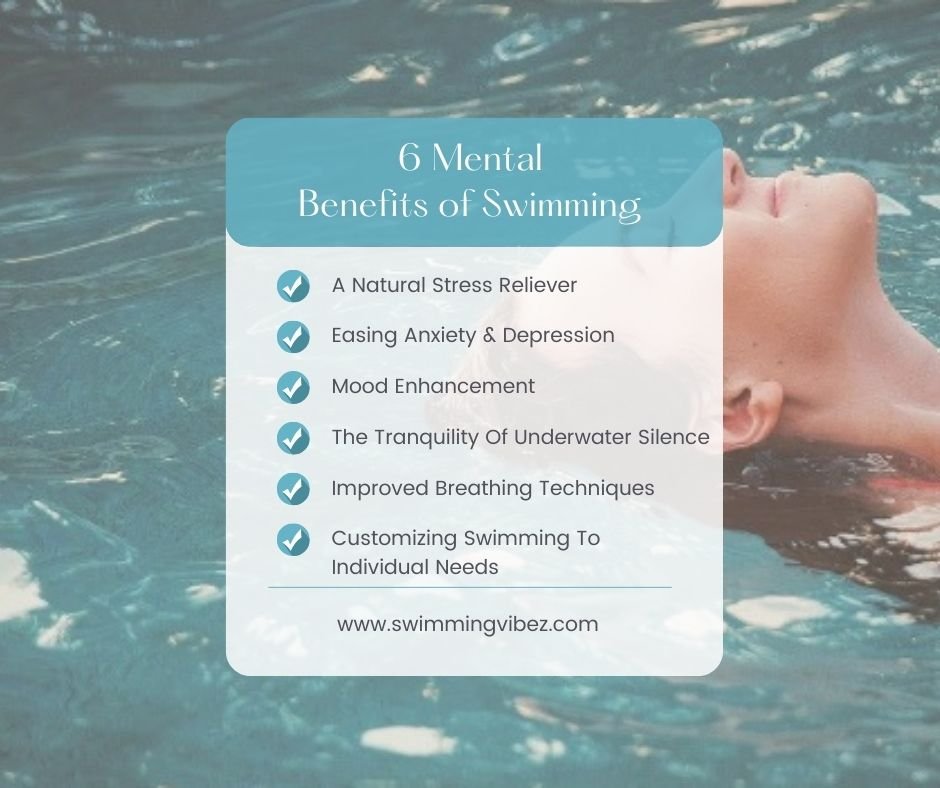The benefits of swimming for mental health are undeniable. In today’s busy world, where stress and mental health concerns are common, it’s vital to prioritize our well-being. Just as we care for our physical health, our mental health plays a crucial role in our overall happiness and success. Now, you can improve your health by swimming, offering a unique blend of physical activity and relaxation. Supported by scientific research, swimming provides a range of benefits for our mental well-being.
Let’s explore six key advantages that swimming offers for our mental health.
Why Is Your Mental Health Important?
Mental health is as crucial as physical health to our overall well-being. It influences how we think, feel, and behave in daily life. It also affects our ability to cope with stress, overcome challenges, build relationships, and recover from life’s setbacks and hardships. Healthy mental states can promote productivity and effectiveness in activities as diverse as work, family life, and education. Conversely, poor mental health can lead to significant difficulties in managing even the smallest tasks in life. Hence, prioritizing mental health is essential for living a balanced, happy, and fulfilling life.
6 Major Benefits Of Swimming On Mental Health

In the vast ocean of mental health practices, swimming is a powerful wave of tranquility and strength, offering a unique blend of physical exertion and mental relaxation. With recent studies highlighting its profound impact on mental well-being, let’s plunge into the six major benefits of swimming on mental health, supported by scientific research.
1. A Natural Stress Reliever
Swimming is not just about physical fitness; it’s a sanctuary for the mind. The rhythmic nature of swimming, combined with the sensation of being enveloped by water, has been shown to significantly reduce stress levels. A study published in the Journal of Mental Health and Physical Activity1 reveals that regular swimming sessions can lead to a marked decrease in stress among participants. This is attributed to the release of endorphins, the body’s natural feel-good hormones, which are known to create a sense of well-being and relieve stress.
2. Easing Anxiety & Depression
The buoyancy of water offers a unique form of resistance and weightlessness, making swimming an excellent exercise for those battling anxiety and depression. According to research highlighted in ScienceDirect2, swimming, especially in open water, can significantly improve mental health and well-being. The physical activity involved in swimming stimulates the production of neurotransmitters that combat depressive symptoms, providing a natural and therapeutic outlet for managing mental health conditions.
3. Mood Enhancement
Diving into a pool can do wonders for your mood. Swimming triggers the release of endorphins, leading to an improved mood and a positive outlook on life. A systematic review in ScienceDirect3 supports this, showing that individuals who engage in regular swimming sessions report feeling happier and more satisfied with their lives. This mood enhancement is a crucial factor in combating mood disorders and promoting a healthy mental state.
4. The Tranquility Of Underwater Silence
There’s something inherently calming about being submerged in water. The silence and solitude of being underwater can have a meditative effect, allowing swimmers to disconnect from the noise of the outside world and find peace within. This natural tranquility is beneficial for reducing anxiety and fostering a calm mental environment. Research published in Emerald Insight4 discusses the well-being benefits of cold water swimming, including the meditative aspects of being in a quiet, immersive environment.
5. Improved Breathing Techniques
Swimming demands control over one’s breathing, making it an excellent practice for improving respiratory techniques and lung capacity. This controlled breathing can be particularly beneficial for individuals dealing with anxiety, as it encourages a focus on breath and present moment awareness, similar to mindfulness meditation practices. The discipline developed through swimming can translate into better stress management and anxiety reduction in daily life.
6. Customizing Swimming To Individual Needs
Swimming is flexible and can be adapted to suit individual mental health needs. Whether it’s the gentle, meditative laps of leisure swimming, the adrenaline rush of competitive swimming, or the serene experience of open water swimming, each form offers unique benefits. For those new to swimming, starting with short, manageable sessions and gradually increasing intensity can help build confidence and resilience. It’s important to listen to your body and choose a swimming routine that aligns with your mental health goals.
Final Words
From stress relief to mood enhancement and improved swimming techniques, swimming offers a holistic approach to nurturing our psychological well-being. As we navigate the challenges of modern life, prioritizing mental health is essential for achieving a balanced, happy, and fulfilling existence. Incorporating swimming into our routines promotes physical fitness and provides a sanctuary for the mind, allowing us to find tranquility and strength amidst life’s waves. So, whether it’s a leisurely swim or an invigorating session in open water, let’s embrace the therapeutic power of swimming to support our mental health journey.







